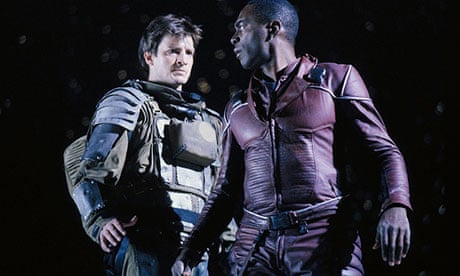Science fiction loves a good paradox. Here's one for you: how can a genre that dreams up alien cultures and mythic races in such minute detail seemingly ignore the ethnic, religious, gender and sexual diversity right here on the home planet, here in the real world?
In other words, for a school of writing that swims so deeply in the unconventional, why is science fiction and fantasy so darned conventional?
This summer, those conventions are finally being challenged. It started with a row over the Science Fiction and Fantasy Writers of America's (SFWA) magazine, Bulletin, which featured a woman in a chainmail bikini on the cover. But it has come to a head over the past week, after the World Science Fiction Convention, or WorldCon, set people asking why the majority of writers are straight white males from the US and UK, and why they mainly write about straight white males?
The author Jim C Hines sparked a conversation on Twitter after posting a picture of the all-white past, present and future chairs of WorldCon and coining the hashtag #DiversityinSFF. As the South African books blogger Lauren Smith wrote, it's a problem often talked about in SFF circles. "These genres – or at least their English-language versions – lack diversity, with the major problem being that white male authors and straight, white, predominantly male characters are favoured," she said, adding that it's clear "who and what is underrepresented: anyone who is POC [person of colour], female, gay, transgendered; settings and cultures that aren't North American or European; non-western folklore and mythology".
Saladin Ahmed, who was born in Detroit and raised in a working-class, Arab American enclave in Michigan, was one of the non-white males at WorldCon: his novel Throne of the Crescent Moon was shortlisted for best novel at the Hugo awards, given out at the convention. He called for diversity in science fiction to be extended even further – to class. He tweeted: "Class diversity also needs to be part of #DiversityinSFF. I want fewer kings and starship captains, more coach drivers and space waitresses."
One of the most telling tweets about the whole business came from London-born, US-based editor and writer Maurice Broaddus, who said simply: "Outside the #worldcon hotel, brown people everywhere. At #worldcon, it takes two hands to count us."
As Smith says, an often-talked-about topic. But the difference this time is that people seem hungry for change – and change there was, almost immediately. Tor.com is one of the largest publishers of online fiction in the world, allied to but separate from Tor Books, and within hours they had amended their guidelines to read: "We want our stories to represent the full diversity of speculative fiction, and encourage submissions by writers from underrepresented populations. This includes but is not limited to writers of any race, gender, sexual orientation, religion, nationality, class and ability, as well as characters and settings that reflect these experiences."
Maybe science fiction is finally catching up with the shift in the demographic of its audience – if you think it's spotty teenage boys with Buffy posters in their bedrooms, come on, what planet are you on? Or perhaps the freedoms offered by electronic publishing are allowing a wider cross-section of writers to find an audience. Or maybe this revolution is being driven by social media networks, such as Twitter, and a sense of community, especially among younger fans.
A note of warning, however, before the banners are unfurled and the barricades stormed: this shouldn't be about young guns v the old guard – ageism is an enemy of diversity, too, after all. And secondly, while Twitter storms often whip up a head of steam, just as often they blow themselves out. We have the impetus; now we need momentum.
Over to Cheryl Morgan, critic, publisher and Con veteran, who wrote on her blog: "Most of you who have been clamouring for change are not going to help with that fight. You are professional authors or publishers, or you are the sort of person who only wants to buy a ticket to a convention, not help run it, or you have an incredibly busy life doing other things and just can't afford the time for all that volunteer work. That's OK, I understand.
"The thing is, though, that if you don't help, who will?"

Comments (…)
Sign in or create your Guardian account to join the discussion